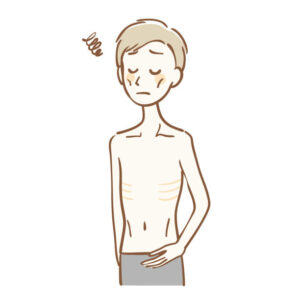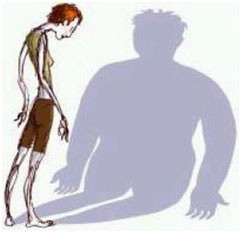Anorexia nervosa is a serious mental disorder that affects both men and women. However, there is a growing problem with male anorexia that has not been getting enough attention. Men who suffer from this disease often feel ashamed and embarrassed to talk about it, which leads to many cases going undiagnosed. In this blog post, we will discuss the symptoms of male anorexia, as well as how to get help if you or someone you know is suffering from it.
Contents
Defining Male Anorexia

Male anorexia is an eating disorder that is characterized by an intense fear of gaining weight. This can lead to drastic measures such as starving oneself, excessive exercise, and the use of diet pills or laxatives. Men with anorexia often have a distorted view of their bodies, thinking they are larger than they actually are. As a result, they may obsessively compare themselves to other people, which can lead to feelings of inadequacy and low self-esteem.
It is important to note that male anorexia is not the same as having an ideal body type. While it is perfectly normal for men to want to be physically fit, those with anorexia take this to an extreme and allow their fear of gaining weight to control their lives. This can lead to serious health problems.
Typically, anorexia is thought to only have an effect on girls, but this is not the case. It is becoming more and more common in boys and young men, with studies showing that the number of males suffering from anorexia has been on the rise in recent years. This is likely due to a number of factors. It is important to be aware of the signs and symptoms of male anorexia so that we can better help those who are suffering from it.
Symptoms

The symptoms of male anorexia can vary depending on the severity of the disorder. However, there are some common signs that indicate someone may be suffering from this disease. These include:
- severe weight loss
- preoccupation with food and body image
- compulsive exercise
- obsessively counting calories
- denial of hunger or fatigue
- wearing baggy clothes to hide weight loss
- skipping meals or making excuses not to eat
- low stamina
- use of diet pills, laxatives, or diuretics
- irritability or mood swings
- social withdrawal
- low self-esteem
These are a few tell-all signs that someone might be struggling with an eating disorder. It is important to note that not everyone will experience all of these symptoms. However, if you or someone you know is exhibiting any of these behaviors, it is important to seek help.
Causes
There is no single cause of male anorexia. Rather, there are multiple factors that can contribute to men developing an eating disorder. These may include:
Physical Factors
Physical factors that can contribute to male anorexia include:
- History of dieting or weight fluctuations: Men who have previously yo-yo dieted or experienced significant weight fluctuations are more likely to develop an eating disorder.
- Family history of eating disorders or other mental health disorders: Individuals with a family history of eating disorders or other mental health disorders are more likely to develop an eating disorder themselves.
- Brain chemistry: Abnormalities in brain chemistry can play a role in the development of an eating disorder. For example, serotonin is a chemical in the brain that helps regulate mood and appetite. Low levels of serotonin have a link with an increase in the risk of developing an eating disorder.
- Puberty: Puberty can be a difficult time for many boys. During this time, they may experience changes in their bodies that they are not comfortable with. This can lead to feelings of insecurity and anxiety, which may contribute to the development of an eating disorder.
- Other medical conditions: There are some medical conditions that can lead to weight loss and a preoccupation with body image. These include problems with the thyroid gland, digestive disorders, and cancer.
These are a few of the physical factors that can contribute to male anorexia. However, it is important to note that most men who suffer from an eating disorder do not have any underlying medical conditions.
Psychological Factors

Psychological factors that can contribute to male anorexia include:
- Body dysmorphic disorder: This is a mental health disorder characterized by an obsession with one or more perceived flaws in appearance. Individuals with this condition may spend a lot of time thinking about their appearance and comparing themselves to others. This can lead to feelings of low self-esteem and anxiety, which may trigger disordered eating behaviors.
- Need for control: Men with anorexia often feel like they are not in control of their lives. As a result, they may turn to food and their bodies as a way to gain a sense of control.
- Perfectionism: Many men with anorexia are perfectionists. They often have high standards for themselves and feel like they must meet these standards in all aspects of their lives.
- Peer pressure: The pressure to be thin or muscular can be especially strong for teenage boys and young men. This pressure may come from friends, family, the media, or society in general.
- Low self-esteem: Men with anorexia often have low self-esteem. This may be due to a number of factors, such as being overweight as a child or feeling like they don’t measure up to others.
- Trouble coping with stress or emotions: Men with anorexia may have difficulty coping with stress or negative emotions. They may turn to food restrictions as a way to cope with these feelings.
- Unhealthy relationships with food and exercise: Men with anorexia often have an unhealthy relationship with food and exercise. They may see food as the enemy and exercise as a way to burn calories and lose weight.
All of these psychological factors can contribute to the development of male anorexia. However, it is important to note that not all men with an eating disorder will have all of these psychological factors.
Social Factors
Society and culture can also play a role in the development of male anorexia. Some of the social factors that can contribute to male anorexia include:
- Media: The media plays a role in the development of eating disorders in both men and women. The unrealistic body standards portrayed in the media can lead to feelings of inadequacy and low self-esteem. This can trigger disordered eating behaviors in individuals who are already predisposed to developing an eating disorder.
- Comparisons: Comparing oneself to others is a common human behavior. However, for individuals with eating disorders, comparisons can be dangerous. Constantly comparing oneself to others can lead to feelings of inadequacy and low self-esteem. This can trigger disordered eating behaviors in individuals who are already predisposed to developing an eating disorder.
- Peer pressure or cultural influences: The pressure to be thin or muscular can be especially strong for teenage boys and young men. This pressure may come from friends, family, the media, or society in general.
- Gender roles: Traditional gender roles often dictate that men should be strong and stoic. As a result, men may feel like they cannot express their emotions or seek help for fear of appearing weak. This can also lead to men feeling like they have to be in control of all aspects of their lives, including their bodies and food intake.
All of these social factors can contribute to the development of male anorexia.
It is important to remember that anyone can develop anorexia, regardless of their background. If you are a man struggling with anorexia, know that you are not alone. There are many resources available to help you on your road to recovery. With the right treatment, you can overcome this disorder and live a happy and healthy life. If you suspect that you or someone you know has an eating disorder, don’t hesitate to reach out for help. The sooner treatment is started, the better the outcome will be.
Reasons Why Male Anorexia Is Overlooked

Male anorexia is often overlooked because of the stereotype that eating disorders only affect women. This is not true! Eating disorders can affect anyone, regardless of their gender, age, or background. There are several reasons why male anorexia may be overlooked. Some of them include instances such as:
- Eating disorders are often seen as a “woman’s issue.” or a “teenage girl’s disease.” This is one of the most common misconceptions about eating disorders. In reality, eating disorders can affect anyone, regardless of their gender or age
- Men are less likely to seek help for mental health issues. Men are often raised with the belief that they should be strong and stoic. As a result, they may be less likely to seek help for mental health issues like anorexia.
- Symptoms of anorexia may be different in men. For example, men with anorexia may be more focused on building muscle mass and less focused on weight loss. As a result, their symptoms may be less obvious to others.
- It is also seen that family and friends are more likely to intervene if they see a woman struggling with anorexia. This is likely because eating disorders have been portrayed as a “woman’s issue” for so long. As a result, family and friends may be less likely to recognize the signs of anorexia in a man.
If you are a man struggling with anorexia, know that you are not alone. There are many resources available to help you on your road to recovery. With the right treatment, you can overcome this disorder and live a happy and healthy life.
Effects On Life

Anorexia can have a significant impact on all aspects of life. It can affect various domains of life such as:
- Physical health: Anorexia can lead to a number of physical health problems. These include:
-weight loss or being underweight
-malnourishment
-fatigue
-brittle bones
-increased risk of injury
-weak immune system
-low blood pressure
-stomach problems
-low testosterone levels
-cardiovascular problems
In addition, severe anorexia may also lead to potentially threatening disorders such as:
-osteoporosis
-rectal bleeding
-electrolyte imbalance
-kidney failure
-heart failure
- Mental and emotional health: Anorexia can also have a negative impact on mental and emotional health. Some of the problems that may occur include:
-anxiety
-obsessive-compulsive disorder (OCD)
-distorted body image
-low self-esteem
- Cognitive functioning: Anorexia can also impact cognitive functioning. This includes issues with:
-concentration
-memory
-decision-making skills
-perception
- Social life: Anorexia can also take a toll on social life. Individuals with anorexia may withdraw from friends and family. These effects can look like:
-avoiding social situations-
losing interest in activities that were once enjoyed
-strained relationships
- Work/school: Anorexia can also interfere with work or school. This may manifest as:
-decreased productivity
-increased absences
-tardiness
-job loss
-financial problems
Anorexia can have a significant impact on all aspects of life. It is important to get help if you or someone you know is struggling with an eating disorder. With the right treatment, individuals can recover and live happy and healthy lives.
Treatment Options
There are a number of treatment options available for individuals struggling with anorexia. Some of these include:
Psychotherapy
This is a type of therapy that can help individuals understand and work through the emotions and thoughts that are driving their disorder. This works by helping individuals to change their negative thinking patterns and behaviors.
- Cognitive-behavioral therapy (CBT)
This is a type of therapy that focuses on helping individuals to identify and change the thoughts and behaviors that are associated with their disorder. CBT has been found to be particularly helpful in the treatment of anorexia.
- Interpersonal psychotherapy (IPT)
This is a type of therapy that helps individuals to understand and work through the interpersonal relationships that may be contributing to their disorder. IPT can help to improve communication skills and resolve conflict in relationships.
- Family-based therapy (FBT)
This is a type of therapy that involves all members of the family in the treatment process. FBT has been found to be particularly effective in the treatment of anorexia in adolescents.
The right kind of therapy approach will be a mutual decision by the therapist and client.
Nutritional counseling
This is a type of therapy that helps individuals to develop healthy eating habits and achieve a healthy weight. Nutritional counseling can be done individually or as part of a group. A professional nutritionist or dietitian can provide this type of counseling. Some of the most common interventions used under this approach include:
- meal planning: This involves working with a nutritionist or dietitian to plan healthy meals that meet the individual’s nutritional needs.
- food journaling: This is a process of tracking the foods that are eaten, as well as feelings and thoughts about food and eating. This can help to identify patterns and triggers for disordered eating.
- cooking classes: These classes can teach individuals how to cook healthy meals. They may also provide support and guidance on making healthy choices when eating out.
- education about nutrition: This can help individuals to understand the importance of balanced nutrition as well as how to make healthy food choices.
- support groups: These groups provide support and information for individuals with anorexia, as well as their families and friends.
The most suitable form of treatment will be decided by your respective healthcare provider.
Medication
There are a number of different types of medication that can help to treat anorexia. These include:
- antidepressants
- anti-anxiety medications
- mood stabilizers
- antipsychotics
- selective serotonin reuptake inhibitors (SSRIs)
Medication should always be used in conjunction with therapy. It is also important to keep in touch with your doctor for getting a valid prescription as well as monitoring the side effects of the medication on the individual.
Self Coping Strategies
There are a number of things that individuals can do to help themselves cope with anorexia. Some of these include:
- Eating regular meals: This is one of the most important things that individuals can do to manage their disorder. It is important to eat three meals a day, as well as snacks in between meals.
- Avoiding trigger foods: Trigger foods are those that cause negative thoughts and emotions. These may be different for each individual, but some common trigger foods include sugary foods, fatty foods, and processed foods.
- Setting realistic goals: It is important to set realistic goals when it comes to weight loss and eating. Individuals should aim to lose no more than two pounds per week.
- Taking breaks: It is important to take breaks from dieting and exercise occasionally. This will help to prevent burnout and allow the body to rest and recover.
- Engaging in physical activity: Physical activity can help to release endorphins, which have mood-boosting effects. It is important to find an activity that you enjoy and that also does not feel like a punishment.
- Practicing relaxation techniques: This can help to reduce stress and anxiety levels. Some common relaxation techniques include activities such as yoga, meditation, and deep breathing exercises.
- Getting enough sleep: Sleep is important for overall health and well-being. It is recommended that individuals get at least eight hours of sleep per night.
- Joining a support group: Support groups provide information and support for individuals with anorexia, as well as their families and friends. It can also be helpful to talk to other individuals who are going through similar experiences.
These are a few ways in which male anorexia can be coped with. If you or someone you know is struggling with an eating disorder, it is important to seek professional help. Treatment for anorexia nervosa should be tailored to the individual’s needs and may involve a combination of different approaches. The most important thing is to start with recovery as soon as possible. With the right treatment and support, individuals with anorexia can regain their health and lead happy, fulfilling lives.
Conclusion
Conclusively, male anorexia is a growing problem in society. It is important to be aware of the signs and symptoms of this disorder, as well as the available treatment options. If you or someone you know is struggling with an eating disorder, seek professional help as soon as possible. With the right treatment and support, individuals with anorexia can recover and lead happy, fulfilling lives.
If you have any questions or would like more information, please feel free to contact Mantra Care! We are a leading provider of affordable, effective, as well as fully confidential therapy sessions. Our services are available globally and led by the most qualified and experienced experts. Visit our website to book a session or download our free Android or iOS app for more information!


